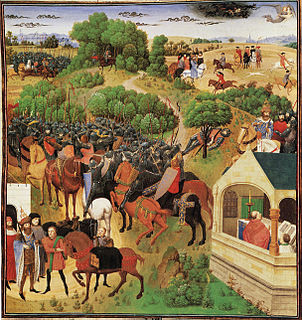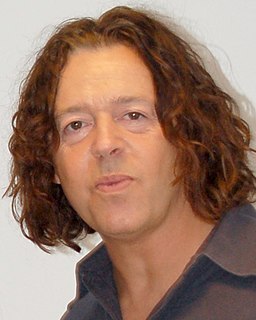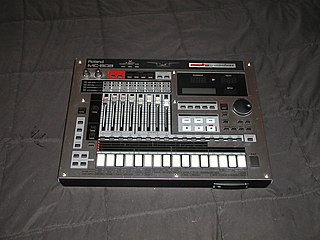Related Research Articles
Roland Corporation is a Japanese manufacturer of electronic musical instruments, electronic equipment and software. It was founded by Ikutaro Kakehashi in Osaka on April 18, 1972. In 2005, Roland's headquarters relocated to Hamamatsu in Shizuoka Prefecture. It has factories in Malaysia, Taiwan, Japan, and the USA. As of March 31, 2010, it employed 2,699 employees. In 2014, Roland was subject to a management buyout by Roland's CEO Junichi Miki, supported by Taiyo Pacific Partners.

Rahsaan Roland Kirk was an American jazz multi-instrumentalist who played tenor saxophone, flute, and many other instruments. He was renowned for his onstage vitality, during which virtuoso improvisation was accompanied by comic banter, political ranting, and the ability to play several instruments simultaneously.

A drum machine is an electronic musical instrument that creates percussion sounds, drum beats, and patterns. Drum machines may imitate drum kits or other percussion instruments, or produce unique sounds, such as synthesized electronic tones. Most modern drum machines allow users to program their own rhythms and beats. Drum machines may create sounds using analog synthesis or play prerecorded samples. Some drum machines have buttons or pads that allow the performer to play drum sounds "live", either on top of a programmed drum beat or as a standalone performance. Drum machines have a range of capabilities, which go from playing a short beat pattern in a loop, to being able to program or record complex song arrangements with changes of meter and style.

Roland was a Frankish military leader under Charlemagne who became one of the principal figures in the literary cycle known as the Matter of France. The historical Roland was military governor of the Breton March, responsible for defending Francia's frontier against the Bretons. His only historical attestation is in Einhard's Vita Karoli Magni, which notes he was part of the Frankish rearguard killed in retribution by the Basques in Iberia at the Battle of Roncevaux Pass.

The Roland TR-808 Rhythm Composer, commonly known as the 808, is a drum machine manufactured by the Roland Corporation between 1980 and 1983. It was one of the first drum machines to allow users to program rhythms instead of using preset patterns. Unlike its nearest competitor at the time, the more expensive Linn LM-1, the 808 generates sounds using analog synthesis rather than playing samples.

The Song of Roland is an 11th-century epic poem based on the Battle of Roncevaux Pass in 778, during the reign of Charlemagne. It is the oldest surviving major work of French literature and exists in various manuscript versions, which testify to its enormous and enduring popularity from the 12th to 16th centuries.

Collective Soul is an American rock band originally from Stockbridge, Georgia. Now based in Atlanta, the group consists of lead vocalist Ed Roland, rhythm guitarist Dean Roland, bassist Will Turpin, drummer Johnny Rabb, and lead guitarist Jesse Triplett. Formed in 1992, Collective Soul released their Hints, Allegations, and Things Left Unsaid album on the independent label Rising Storm Records in 1993. The band went from obscurity to popularity that year after the song "Shine" became an underground hit based on radio play. The album was re-released in 1994 under major label Atlantic Records.

The Roland TR-909 Rhythm Composer is a drum machine introduced by the Roland Corporation in 1983. It succeeded the TR-808, and was the first Roland drum machine to use samples for some sounds. It was also the first Roland drum machine with MIDI functionality, allowing it to synchronize with other devices. Though it was a commercial failure, the 909 became influential in the development of electronic dance music genres such as techno, house and acid.

Diamond Rio is an American country music band. The band was founded in 1982 as an attraction for the Opryland USA theme park in Nashville, Tennessee, and was originally known as the Grizzly River Boys, then the Tennessee River Boys. It was founded by Matt Davenport, Danny Gregg, and Ty Herndon, the last of whom became a solo artist in the mid-1990s. After undergoing several membership changes in its initial years, the band has consisted of the same six members since 1989: Marty Roe, Gene Johnson, Jimmy Olander, Brian Prout (drums), Dan Truman (keyboards), and Dana Williams.
Durendal, also spelled Durandal, is the sword of Roland, legendary paladin of Charlemagne in French epic literature. It is also said to have belonged to young Charlemagne at one point, and, passing through Saracen hands, came to be owned by Roland.

Roland Orzabal is an English musician, singer-songwriter, and record producer. He is best known as a co-founder of Tears for Fears, of which he is the main songwriter and joint vocalist, but he has also achieved success as a producer of other artists including Oleta Adams and Emiliana Torrini. In 2014, Orzabal published his first novel.
Oliver, sometimes referred to as Olivier de Vienne or de Gennes, is a fictional knight in the Matter of France chansons de geste, especially the French epic The Song of Roland. In the tradition, he was Roland's closest friend, advisor, confidant and brother-in-law to be, one of Charlemagne's twelve peers and brother of Aude, Roland's betrothed. He dies with Roland at the Battle of Roncevaux Pass. Some critics have linked his name to the olive tree, a biblical symbol of divine wisdom.
"Roland the Headless Thompson Gunner" is a song composed by Warren Zevon and David Lindell and performed by Zevon. It was first released on Zevon's 1978 album Excitable Boy. It was the last song he performed in front of an audience, on The Late Show with David Letterman, before his death in 2003.

The Roland TR-505 Rhythm Composer was released by Roland, in 1986. It is a drum machine and MIDI sequencer from the same family as the Roland TR-909, TR-808, TR-707, and TR-606. The drum kit includes basic rock drum sounds similar to those of the TR-707, plus a complement of Latin-style drum sounds similar to those of the TR-727
In the legendary Song of Roland, Almace, Almice or Almacia is the sword of Turpin, Archbishop of Reims, one of the last three Franks to die at the Battle of Roncevaux Pass, along with Roland and Gualter de Hum.

The Roland MC-808 was a groovebox, announced at the Winter NAMM in 2006. It is the successor to the late Roland MC-303, Roland MC-307, Roland MC-505 and Roland MC-909.

Olifant was the name applied in the Middle Ages to ivory hunting horns made from elephants' tusks. One of the most famous olifants belonged to the legendary Frankish knight Roland, protagonist of The Song of Roland.

The paladins are twelve fictional knights of legend, the foremost members of Charlemagne's court in the 8th century. They first appear in the mediaeval chanson de geste cycle of the Matter of France, where they play a similar role to the Knights of the Round Table in Arthurian romance. In these romantic portrayals, the chivalric paladins represent Christianity against a Saracen (Muslim) invasion of Europe. The names of the paladins vary between sources, but there are always twelve of them led by Roland. The paladins' most influential appearance is in The Song of Roland, written between 1050 and 1115, which narrates the heroic death of Roland at the Battle of Roncevaux Pass.
Murgleys, or Murgleis is the sword of Ganelon, a traitorous French (Frankish) count and nemesis to the titular hero of the epic La chanson de Roland.
Aude, or Alda, Alde, was the sister of Oliver and betrothed of Roland in The Song of Roland and other chansons de geste. The story of her engagement to Roland is told in Girart de Vienne.
References
- ↑ Sayers, Dorothy L., translator (1957). The Song of Roland . Hammondsworth, Middlesex, England: Penguin Books. p. 38. ISBN 0-14-044075-5.
| This article relating to a European folklore is a stub. You can help Wikipedia by expanding it. |